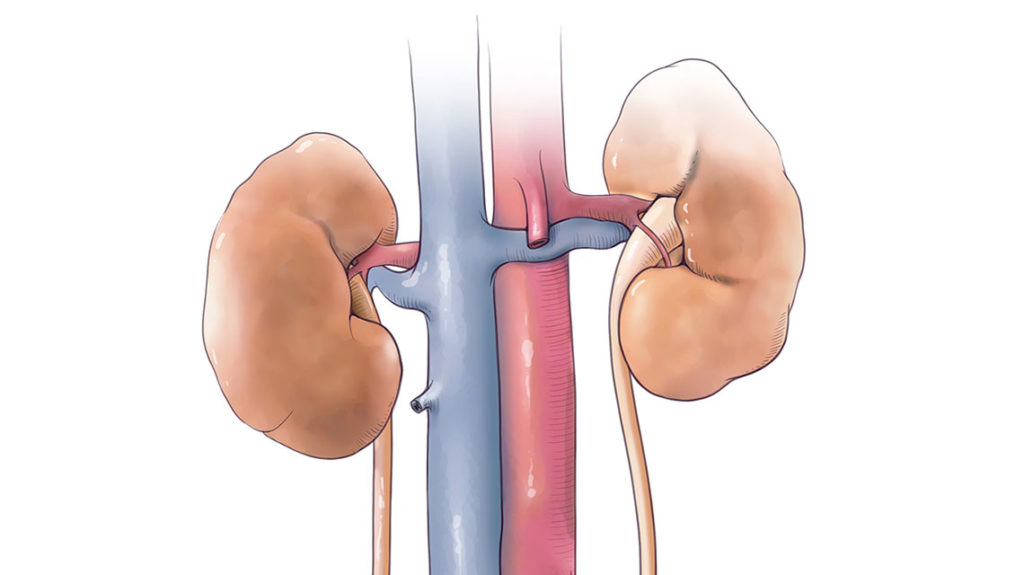Can a Kidney Failure Risk Equation Validated in Adults Predict Kidney Failure in Children?
Can a Kidney Failure Risk Equation Validated in Adults Predict Kidney Failure in Children? https://pediatricsnationwide.org/wp-content/uploads/2021/01/Urinary-system-No-Background-kidney-header-1024x575.jpg 1024 575 Lauren Dembeck Lauren Dembeck https://pediatricsnationwide.org/wp-content/uploads/2021/03/Dembeck_headshot.gif- September 10, 2020
- Lauren Dembeck

Novel disease-specific biomarkers are needed to improve prediction models in pediatric disease.
Obstructive uropathy is a frequent cause of kidney injury in children, and it is estimated to cause approximately one-sixth of pediatric kidney failure cases in North America. However, risk equations to predict kidney disease progression have not yet been developed for children.
To address this need, physicians at Nationwide Children’s Hospital examined whether a validated kidney failure risk equation (KFRE) developed in adults could accurately predict the 5-year risk of kidney failure in children. The study was reported in Pediatric Nephrology.
“It would be very helpful when we saw a patient in the clinic if we could apply an equation like this and give the family a better idea of whether we expect their child to progress to end stage kidney disease in the next five years, and if a child appears to be high risk, we could be more aggressive in their therapy to delay or prevent that progression,” says senior study author Daryl McLeod, MD, MPH, a pediatric urologist at Nationwide Children’s.
The investigators took advantage of the prospectively collected, longitudinal CKiD (Chronic Kidney Disease in Children) dataset, which contains over 900 cases of children with mild to moderate chronic kidney disease. The 5-year risk of kidney failure was estimated using baseline data and published parameters for the KFRE, containing 4 or 8 variables, in 118 children with obstructive uropathy and a low estimated glomerular filtration rate (eGFR, <60 mL/min/1.73 m2).
The 4-variable (age, sex, eGFR, and albumin-to-creatinine ratio) and 8-variable (original 4 variables and serum calcium, phosphate, bicarbonate and albumin levels) KFRE yielded similar, suboptimal results for 5-year discrimination (C, 0.75 and 0.78, respectively); both results were lower than were previously observed in adults, suggesting room for improvement for KFRE use in children.
“The results from this study show the need for the investigation of other novel markers to try to improve upon this equation and predict which of these children with obstructive kidney injury will eventually progress to kidney failure,” says Dr. McLeod.
Measures of accuracy of both models were also suboptimal. For example, when the predicted risk threshold for the 4-variable KFRE was 30%, it provided only 82.6% sensitivity and 75.0% specificity to identify patients who progressed to kidney failure within 5 years.
“This study was devised and implemented by a pediatric urologist who was making use of data that traditionally are analyzed by nephrologists. This is a great illustration of the potential for the fields of urology and nephrology to cross-fertilize,” says study author Brian Becknell, MD, PhD, a pediatric nephrologist at Nationwide Children’s.
Dr. McLeod and Dr. Becknell are continuing in their collaborative efforts to identify new biomarkers and are considering integrating additional clinical and radiologic data to improve upon this KFRE.
“Plugging standard laboratory values into kidney failure risk equations is very tantalizing,” says Dr. Becknell. “I think that we as care providers really need to challenge ourselves to use whatever existing data is out there to assess their ability to improve our predictions of whether kids are going to need dialysis or transplant.”
Reference
Sebastião YV, Cooper JN, Becknell B, Ching CB, McLeod DJ. Prediction of kidney failure in children with chronic kidney disease and obstructive uropathy. Pediatric Nephrology. 2020 Jun 25. Online ahead of print.
Image credit: Nationwide Children’s
About the author
Lauren Dembeck, PhD, is a freelance science and medical writer based in New York City. She completed her BS in biology and BA in foreign languages at West Virginia University. Dr. Dembeck studied the genetic basis of natural variation in complex traits for her doctorate in genetics at North Carolina State University. She then conducted postdoctoral research on the formation and regulation of neuronal circuits at the Okinawa Institute of Science and Technology in Japan.
-
Lauren Dembeckhttps://pediatricsnationwide.org/author/lauren-dembeck/
-
Lauren Dembeckhttps://pediatricsnationwide.org/author/lauren-dembeck/
-
Lauren Dembeckhttps://pediatricsnationwide.org/author/lauren-dembeck/
-
Lauren Dembeckhttps://pediatricsnationwide.org/author/lauren-dembeck/January 29, 2019
- Posted In:
- In Brief







